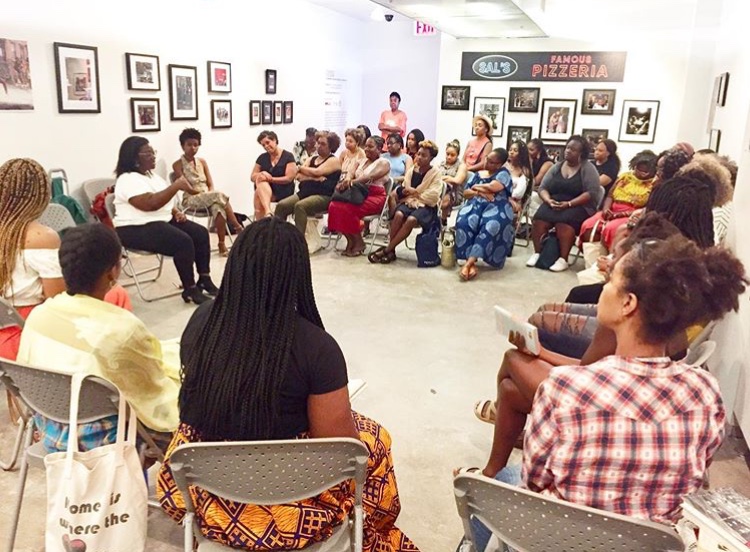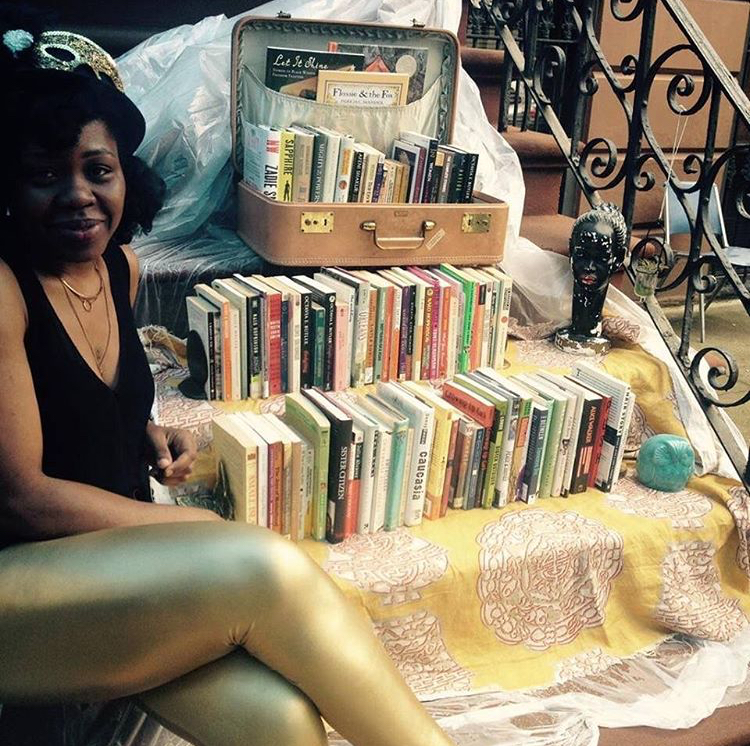In 2015, Brooklyn, New York-based artist OlaRonke Akinmowo lugged 100 books — all written by black women — to a brownstone stoop and launched the uncertain beginnings of her newest project, the Free Black Women’s Library.
Dressed in a black tank top and gold leggings, Akinmowo danced barefoot in front of her collection “in honor of the sacred beauty” of these authors.
“Black women’s words have saved my life, healed me, nurtured me and provided me with the comfort that I’ve needed in every rough moment of my life,” Akinmowo wrote in an Instagram post commemorating that anniversary, “and I wanted to share that fact/testimony.”
As the first patron arrived — an 8-year-old girl in a vibrant, multicolored dress — Akinmowo watched a mobile library featuring black women authors become a necessary idea.
In this organic process, she found new spaces to display the books — museums, theaters, art galleries, churches, and festivals. Now, four years later, up to 200 people will come through the library’s traveling installation each month.
“I want it to feel inclusive and diverse,” Akinmowo said in a phone interview. “That’s why I like to have everything from children’s books to young adult to erotica. Even if people come not knowing what they’re looking for, they’ll find something.”
What started out as Akinmowo’s personal collection quickly multiplied ten-fold. Donations began pouring in from publishers, writers, online supporters and of course, patrons themselves, who adhere to the “bring a book, take a book” code.
Usually they’re looking for the classics, Akinmowo said. Octavia Butler, Audre Lorde, and bell hooks are perennial favorites. “Toni Morrison…she’s iconic. Whether it’s Bluest Eye or Jazz or Sula or Paradise. They come in asking, ‘Do you have any Toni Morrison?’”
She doesn’t catalog the books or direct patrons to any particular author. Instead, she allows the library to exist in a more interactive way, making the search for a resonant title part of the fun. She does, however, note which genres people are seeking. (After “Black Panther” was released last year, she noticed an uptick in the number of people looking for science fiction.)
The 40-something curator turned to books to get through a difficult childhood in Brooklyn. “Having an unstable family, libraries offered me comfort, safety, resources, inspiration, education,” she said, adding that she began reading around age 3. ”That’s part of the foundation for my project – my love for libraries and books.”

That love is apparent at the pop-ups. Everything is free, from the books themselves to the associated community conversations that spring up around a monthly theme. One of their recent events featured bell hooks’ All About Love, and the discussion that followed pulled from the text.
The library thrives thanks to donations and volunteers who move the books from space to space each month. Akinmowo runs it as a side project amidst her day jobs as a set decorator and yoga teacher. She is currently seeking funding to make the library more sustainable and even more community oriented.
Enthusiasts are adapting the model in different cities — most notably Atlanta, Detroit and Los Angeles. “Having branches and forums in other cities was something I always dreamt could happen,” Akinmowo said, “so it’s really exciting to see that visualization become reality.”
Frequently, the founder invites poets and writers to share in the space. Last month, author Tressie McMillan Cottom came up from Virginia to discuss her newest book, Thick, with library guests, a move that surprised and inspired Akinmowo. Cottom’s collection of essays on race, beauty, politics and media proved a fertile starting point for the assembled patrons.
“These intimate vulnerable conversations we’re having between strangers is so powerful,” Akinmowo said. “That deep connection. We talked for two and a half hours. It was a full house. Seeing these black women share themselves, creating a space where black women can feel seen and heard…it feels like really sacred work.”

Maryann Shakir
July 26, 2019
That’s awesome. I enjoyed seeing this piece- thank you for writing.